Travel Futures and Sail Cargo
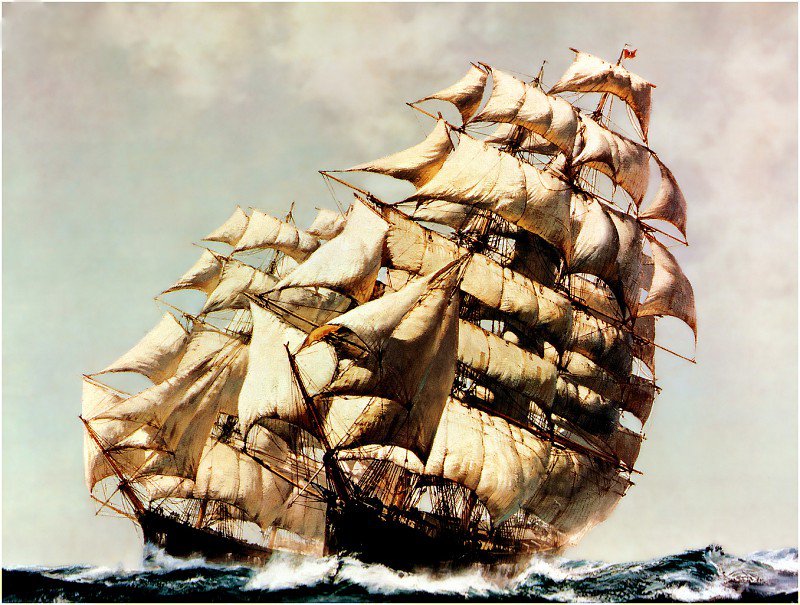
As we wake up to the depth of the covid crisis and the remaining climate emergency, the opportunity for a dramatic shift in how and why we travel has emerged.
A few years ago the idea of transporting goods by sail cargo was unheard of. Now it is a rising trend for companies monitoring their entire production chain for sustainability. There’s a new movement that’s barely been covered in the media that has evolved quietly below radar.
Back in January we asked Could Sleeper Trains Replace International Air Travel? Now we are asking could sail replace polluting cargo ships as we re-think the need for exports and the way we transport essential goods and people?
Sail cargo is an initiative that is gaining more interest as an emission-free alternative to conventional shipping. Companies like Eco Clipper have plans for trans-Pacific, trans-Atlantic and global routes for their ships.
EcoClipper tell us:
“As you read this, there are many sailing cargo ship projects underway. The concept has proven itself in the 21st century. Recently the two first industry lobbies where established; the International Wind Ship Association (IWSA) and the Sail Cargo Alliance (SCA). We can speak of the emergence of a real new industry. EcoClipper, with her experienced team, will be the organization to scale up the successes of the current sailing cargo companies, to launch a fleet of newbuilt large scale sailing cargo vessels, and sustainably connect all continents of the world.”
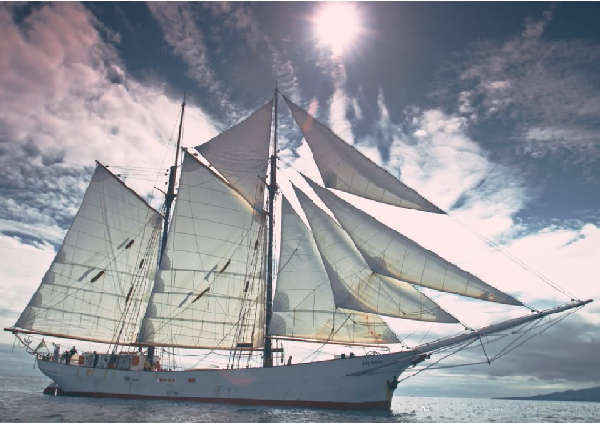
Already Avontuur managed by Timbercoast, Tres Hombres managed by Fairtransport and Gallant managed by Blueschooner Company and many others are in operation. Companies like New Dawn Traders (Fair Trade by Sail) and Fairtransport already sail routes between European ports and across the Atlantic.
As we work on a Just Recovery programme, these ideas which in other times might seem absurd need to be taken seriously.
Shipping Impact
Resistance and incredulity will be widespread. The problem is that much of our ideas about travel and transport are hard-wired into our assumptions about the world, that we can have anything we like at any time from anywhere, that we can go anywhere we like at any time. This is assumed to be a fundamental good and a fundamental right, when in fact it is untenable.
Globalisation is assumed as the apogee of progress itself. But if the current crisis tells us anything it’s that the globalised world is deeply fragile and the need to re-think core assumptions about how we organise is urgent.
The impact of container and cruise ships on the environment is vast but incredibly largely unregulated.
Aviation and shipping is covered by the Paris Agreement on climate change. The Paris deal aims to limit the global temperature rise to below 2°C this century by reducing emissions. But it is the job of the International Maritime Organisation (IMO) to negotiate a reduction in emissions from the industry. Environmentalists blame the organisation for the industry’s slow response.
“International shipping produces nearly one billion tons of CO2 emissions,” says Tristan Smith, a reader in energy and shipping at the UCL Energy Institute and leader of the UCL Energy Shipping Group. “This needs to reduce rapidly if we are to avoid the risks of dangerous climate change – at least halving in magnitude between now and 2050.”
“Reducing emissions from shipping is not an easy thing to do,” agrees Maurice Meehan, director of global shipping operations with the Carbon War Room, an international think-tank working on market-based solutions to climate change.
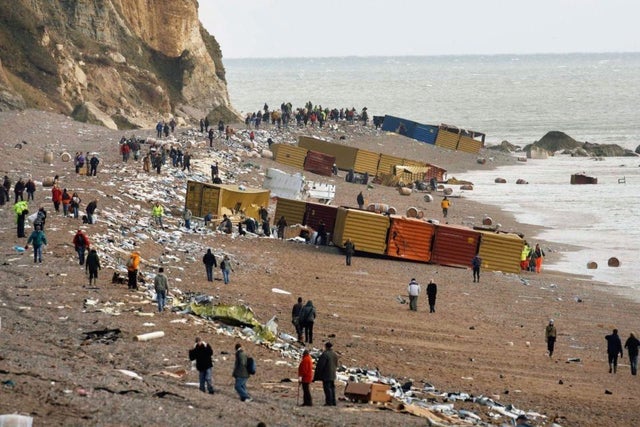
In 2018 it was reported that greenhouse gas emissions from shipping equals the carbon footprint of a quarter of passenger cars in Europe and stands in the way of countries reducing emissions and limiting runaway global heating.
Despite the scale of shipping emissions from both container and cruise ships, they are not part of emissions reduction targets made by countries as part of the Paris agreement on climate change.
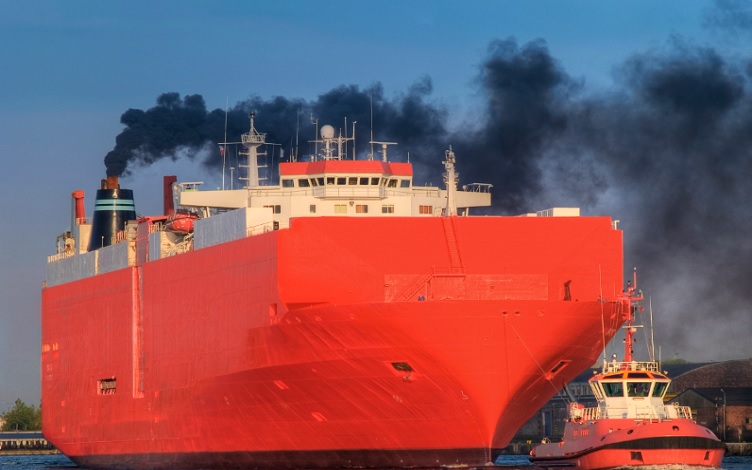
The shipping sector emitted about 139m tonnes of CO2 in 2018 – equal to CO2 from a quarter of Europe’s total passenger car fleet or 68m cars, the report, EU Shipping’s 2018 Climate Record, said. The report analysed the data and calculated that a single container shipping operator had joined coal plants and Ryanair in the EU’s list of top 10 carbon emitters. The operator – the Mediterranean Shipping Company (MSC) – moves consumer goods, ranging from electronics and fresh fruit to clothes and toys. It was responsible for about 11m tonnes of CO2 emissions, the report claimed.
Faig Abbasov, who wrote the report, said:
“A company that consumers have never heard of has joined the top 10 polluters list in Europe. This industry doesn’t pay a cent for its carbon emissions and the EU has so far done nothing to curb its damage. European trade doesn’t have to be dirty just because EU leaders have neglected to clean up shipping.”
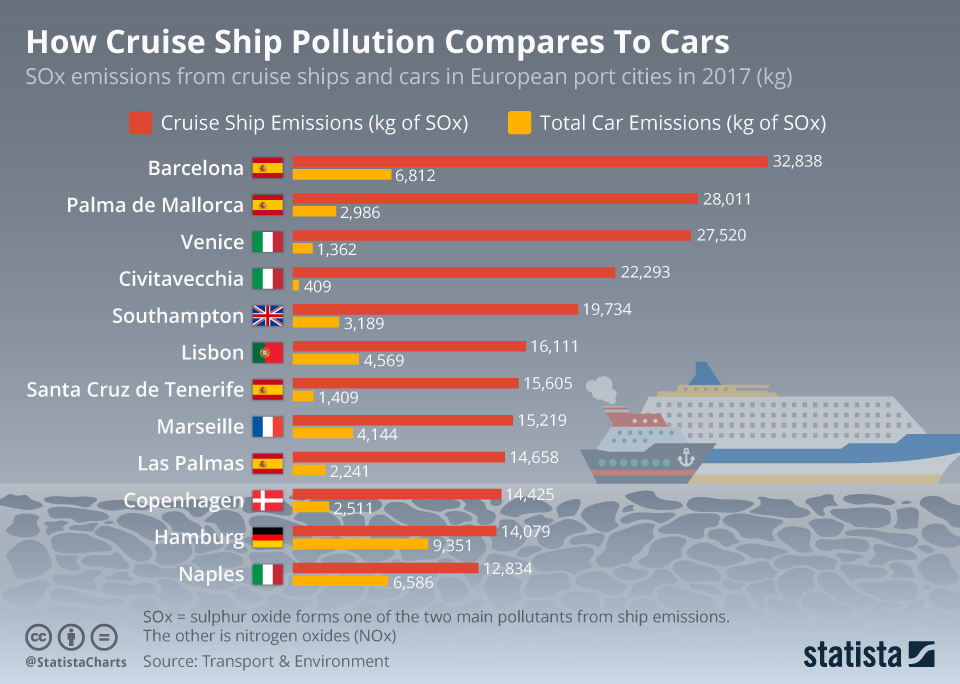
This is an extraordinary predicament.
What makes this worse is that most ships burn bunker fuel. That’s the dregs left over at the end of the refinery process. It is an ecological nightmare. It is heavy and toxic, doesn’t evaporate, and emits more sulphur than most other fuels.
The market-based solutions to these endemic climate are proven failures.
Fly With Me?
The same goes for the aviation industry.
Nicole Badstuber, a transport policy and travel behaviour researcher at University College London and the University of Westminster, writes:
“Passenger air travel has come to a virtual standstill. EasyJet has grounded its entire fleet, and Ryanair has announced it will not resume commercial flights before June. British Airways has elected to suspend 36,000 staff and has closed its operations at Gatwick and London City airports until further notice. Overall, passenger flights have decreased by up to 95%. With job losses for airline and airport staff likely to reach hundreds of thousands, the government’s priority is, unsurprisingly, securing workers’ income and keeping strategic routes open. But if government intervenes and looks to buy a stake in airlines, this could be a turning point in transport policy, as the pandemic allows us to pivot to a lower air-travel future. We are already being forced to rethink how we move around, conduct business, keep up family ties and maintain friendships in a globalised world without aviation – a dire necessity, given the urgency of the climate emergency.”
But the globalised travel and transport system is intimately tied to our fossil fuel dependence.
Asking: “Will the coronavirus kill the oil industry and help save the climate?” journalists Damian Carrington, Jillian Ambrose and Matthew Taylor suggest:
“The plunging demand for oil wrought by the coronavirus pandemic combined with a savage price war has left the fossil fuel industry broken and in survival mode, according to analysts. It faces the gravest challenge in its 100-year history, they say, one that will permanently alter the industry. With some calling the scene a “hellscape”, the least lurid description is “unprecedented”. A key question is whether this will permanently alter the course of the climate crisis. Many experts think it might well do so, pulling forward the date at which demand for oil and gas peaks, never to recover, and allowing the atmosphere to gradually heal.”
But Mark Lewis, head of climate change investment research at BNP Paribas has noted:
“When the dust settles, the peak demand narrative will be there stronger than ever,” he said. “This is particularly true if long-haul aviation fails to recover. This has been a very strong source of oil demand growth in recent years but the longer we are at home – remote working, using video conferencing – the more people will wonder: do we really need to get on a plane?”
This week 250 organisations from 25 countries published an open letter directed to governments, urging them to resist any aviation lobby attempts to rush into unfair bailouts of the industry. Instead, governments are implored to use this moment to embed social and environmental conditions, with proper protection for workers and a planned transition towards climate-just mobility. From today onwards, individuals are expressing their support for these demands by signing a rapidly growing petition.
“For decades, the aviation industry has avoided contributing meaningfully to global climate goals and resisted the merest suggestion of taxes on fuel or tickets. Now, airlines, airports and manufacturers are demanding huge and unconditional taxpayer-backed bailouts. We cannot let the aviation industry get away with privatising profits in the good times, and expect the public to pay for its losses in the bad times”, says Magdalena Heuwieser from Stay Grounded, a global network of more than 150 organisations, who endorsed the letter together with other organisations including university institutes, trade unions and climate justice initiatives.
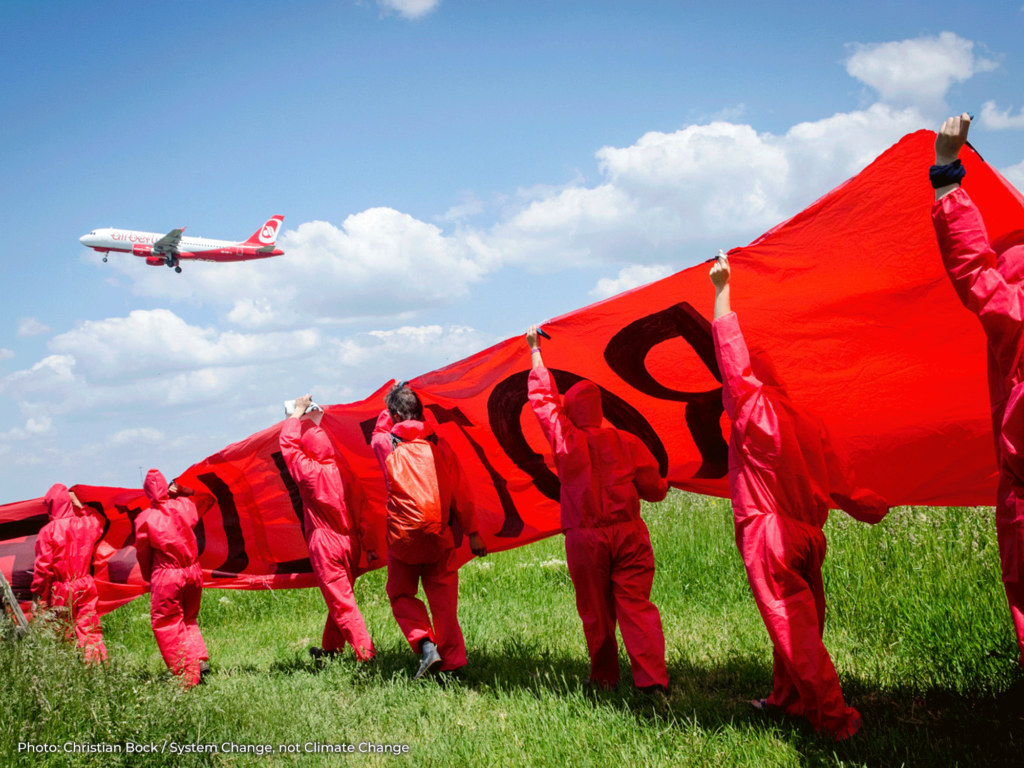
The letter demands that governments:
1) put people first and bail out workers, not shareholders and executives
2) transform the transport sector in a climate-friendly way, by cutting air travel demand and strengthening low-carbon alternatives like rail travel, as well as by shifting of employment into decent climate jobs; and
3) end aviation’s tax exemptions while putting in place a kerosene tax and fair progressive levies on frequent flying.
The airline industry has made a fortune over the past decades, with higher growth rates than most other economic sectors – what led to soaring emissions. Aviation is already responsible for 5-8% of climate heating worldwide, when we include the climate impacts additional to the CO2. This is a huge portion, given that these are caused by few frequent flyers: the world’s richest 10% uses 75% of air transport energy, a recent study found out.
Pablo Muñoz, aviation campaigner at the Spanish organisation Ecologistas en Acción, states: “While we are rightly focused on saving lives and protecting our communities against the immediate health threat of Covid-19, our governments have a choice: they can hand taxpayers’ money to corporations unconditionally, or they can seize the opportunity to start building an economy which doesn’t harm people or the planet.”
Leo Murray, Director of Innovation at climate action charity Possible, adds: “At this time of crisis, we need to focus on what’s most important: protecting ordinary people and building a more secure future for all of us. Rather than bail out airlines to continue with business as usual, we now have a chance to ensure that they change for the better. In return for government support, airlines must protect their workers, and protect the climate by reducing the sector’s emissions in line with the Paris Agreement target of 1.5 °C.”
Future Travel
The solutions to the problems created by globalisation will vary.
Vastly reduced trading of goods is the starting point of a transition to resilient localised circular economies. Travel reduced to new slow and low carbon routes needs to become the new normal. Methods combining old and new technologies in shipping need to takeover. Utilisation of the technologies we have all just had a crash course in render much travel redundant. But more than this, remote working and conferencing challenges the very idea of presenteeism and deeper the nature of much of our industry. Of the long long list of businesses that need a “do not resuscitate” sign around them, the first must be the airline industry and the container and liner industries.
The era of needless travel and constant consumption is over.
Yes we will continue to travel and trade but in a completely different way and at a completely different scale, one that is sustainable and viable for our climate future.

Airships, powered by air-current capture devices – I’m working on it!
Could you provide us with a picture of one of these propsed aircraft?
Thank you Mike, for this, and the sleeper train piece in January which I managed to miss at the time. As economic advisor to the Scottish TUC in the 1980s, I campaigned for forthcoming Channel Tunnel train services to include through sleeper trains from Scotland to destinations in mainland Europe, so as a green transport economist I’m aware of the issues.
International movement of freight by sea is a less discussed issue than air travel, perhaps because journalists and politicians seldom travel on container ships or bulk carriers, but it is no less important, as some of the facts you disclose show. It is certainly true that the oil burned by most ships is dirtier and nastier than almost any other oil used in human endeavour. (Hence the revolutionary nature of the two ferries now languishing part-built in Port Glasgow.)
Scotland was in the 1970s and 80s a world leader in developing windmills and the electricity-generating turbines driven by them. This early leadership by companies like Howdens has long since been lost to countries like Denmark, probably because it had a government which knew the need to direct industrial output in ways the sacred ‘market’ is incapable of foreseeing.
And Scotland has a long history of building innovative sailing ships: the clipper ‘Cutty Sark’ was built on the Clyde, as its Burns-derived name suggests. With a Scottish Government in Edinburgh (which we didn’t have in the darkness of the Thatcher years) committed to doing all it can to promote our successful industrial future, Scotland could now position itself better to build some of the world’s future wind-powered freight vessels. We will never return to the years over a century ago when the Clyde built up to a third of the world’s merchant shipping. But we could utilise our history of excellence in marine engineering and technology to make a contribution. Perhaps the time will return when Norway, with one of the world’s biggest merchant fleets, will again send students of marine engineering to Heriot-Watt and Strathclyde Universities, as it did in about half a century ago.
So Scotland must not ‘miss the boat’ on this issue. I’ll be in touch with my Green MSP Ross Greer on this, and ensure he reads your article.
Hi Dougie – yes the (unwritten) companion piece to this is the potential for Scotland to be a world leader in zero-carbon shipping – both of old technology and new. This is quite possible and – I think – essential. But we need to be both ambitious and innovative (and far-sighted).
Glad to hear it Mike. If you want to chat to me about this, I’d be delighted to help in any way I can – including putting you in touch with one of the leaders of the UCS work-in, which ensured that we still have a significant shipbuilding industry in Glasgow – albeit one now owned by Bae Systems, and confined to building warships. But skills are still there. I don’t currently have a functioning email inbox (hacked!), so can’t give you my address, but I’ll let you know as soon as I have one.
Thanks. Keep in touch.
Heavy marine bunker oil is increasingly being replaced with marine gas oil – the iconic P.S. Waverley switched a few years ago for instance, and LNG. The two newbuildings for Calmac in Port Glasgow are not “revolutionary” as LNG or dual fuel technology is now fairly common with the Baltic and Scandinavian ferry industry in particular now rapidly changing over.
Incidentally if the Calmac newbuildings are completed as LNG/dual fuel vessels and the LNG bunkering facilities are built at their homeports of Ardrossan and Uig, the LNG under current plans will have to be tankered up from the south of England (Essex I believe!) making their carbon footprint larger than the vessels they are replacing!
That’s crazy!
http://www.foci.scot
Walker wingsail had the answer in the last oil pricerise but when the price fel lback noone was interested . Time again ?
Check out Windship Technology, building on that original Walker wingsail concept http://www.windshiptechnology.com/
I would love to think this would be a turning point in human history and a watershed moment for rampant earth destroying capatalisim but if I’m honest I think it will be back to considered normal when it starts to subside. We will be back to digging stuff up, chopping stuff down, burning shit into the air and pouring chemical pish into the sea and by definition the food chain. Its sad that I’m not optimistic but bottom line is as disruptive as this has been it hasn’t as apocalyptic as it would have to be to create the new world order that is so desperately needed. Great article though it follows on from how low paid staff are now front line key workers but again after dust settles society will quickly see them as they once were. I sound so depressing and God I’d love to be so wrong but just can’t see it
Ach cheer up, Mr K Smith! I’m nearly 73 now, and have seen a lot of changes in the world. I even was privileged to play a wee part in some of the more beneficial ones in Scotland.
Greta Thunberg is a wee (and supposedly disadvantaged) teenager. Has she not helped to transform political opinion amongst younger folk especially? Right across the world!
Wee Scotland can still do good things. But we need folks who are prepared to WORK to do that.
@Mr K Smith,
If enough people get behind change, then surely it will happen, no?
Or am i being too simple?
Anyway, cheer up. We’re not dead yet.
This site is my daily fix at 5am in WA. It’s so uplifting to know that Scotland still has the great thinkers and doers that the world needs right now as always we have taken more than our share of pulling the oars and setting sail.
I think there were various kite sail cargo ships being tested over the years, and I guess Greenpeace was tracking these developments. If I recall correctly, a kite sail on a winch can reach higher, faster winds (perhaps moving in different directions at different altitudes?) making it potentially a more powerful design than traditional mast arrangements. According to Wikipedia, the European Union funded a four-year study of wind propulsion:
https://en.wikipedia.org/wiki/Kite_rig
I am pleased to see this article regarding commercial wind propulsion. If you would like further information regarding both wind-assist and primary wind solutions then please check out the International Windship Association website http://www.wind-ship.org
Wind propulsion in shipping is not a far off dream, or limited to small niche projects, but being embraced by some of the largest shipping and other companies in the world. Maersk, MOL, Louis Dreyfus Armatuers, Airbus, Renault, Bureau Veritas, Class NK, Drax, Ariane group and so on
If you would like to receive our newsletter, please drop me line at [email protected]
Happy Easter
I think within the context of short distance shipping, there is only one sensible conclusion – which is hydrogen power. It requires a large “backbone” network of fueling and hydrogen generation to be created, yes, but this is all component parts of any sensible “green new deal”. To my mind, the Scottish government should be utilising it’s inherent interest in CalMac ferries to push this technology, and is one where Scotland could readily become a world leader due to the combination of the required factors: shipbuilding experience, renewables experience, renewables availability and a government with a stake in running those services at a carbon neutral cost.
For long distance shipping, and even for long distance passenger ocean liners, I think like you do we need to look back into history, though perhaps not quite as far. This one will be a controversial point but one I’d be happy to discuss, and it is utilisation of small scale, civilian, nuclear reactors. There was a short glimmer of these ships being created in the late 50s/early 60s before the competition from fossil fuels ultimately undermined the business case for each. Otto Hahn (built by Germany) sailed 1.2m km without so much as a fault, while the US built Savannah was also extremely successful as a trial vessel. The Japanese Mirai perhaps not so much – though the technical flaws were discovered at a design stage and discounted due to cost – a situation we cannot allow to happen again.
The above, I’m sure, comes with an immediate knee jerk no, which to be honest is totally understandable – however with a properly regulated, inspected and fundamentally civilian merchant navy, nuclear is as safe, if not safer, than hydrogen power – given the relative explosion risks etc of high pressure hydrogen. This means two things: removing any military presence beyond technical experts from the nuclear power industry (as per Canada and France) and significant “on shoring” of merchant marine companies who currently operate out of tax havens, usually overseen by Britain in the caribbean. To operate such a fleet would require, again, a build up of skills, conversion of ships and ultimately training of a missing two generations of nuclear engineers which we have lost due to fossil fuel company funded anti-nuclear campaigns and the fear of the atomic bomb.
We undermine our own science when we don’t even consider such technology without properly understanding the relative risks, engineering controls and design features of a modern reactor. We also need to fundamentally understand that nuclear power and nuclear bombs are two very different beasts – and utilising one to enable the other is where a great majority of the design flaws are introduced.
Mass movement of people around the globe, along with movement of goods, is going to be required to some degree in the future. The human race has been shipping/walking/pulling things around it since we stood on two feet, and I believe that it should long continue. We just need to be smarter about how we do it, who controls it and fundamentally keeping our planet safe for future generations to do the same.
Hi Steven, I agree that hydrogen or some form of carrier of that (e.g. ammonia) will likely be part of the solution for shipping, there are challenges for long distance, blue ocean vessels. There is also the fact that this requires a huge ramp up in production, RE generation and infrastructure, The price will initially be very high across the industry (some ares cheaper for sure)
I can only see alternative fuels as a realistic solution if wind propulsion (up to to 30% savings as retrofit) + vessel optimisation (20%+) and operational changes (20%+), this then leaves a c.30% nut to crack for alternative fuels.
Regarding nuclear, I don’t think this will be a viable option until potentially super safe thorium reactors could be commercially produced and marinised, perhaps in a few decades to come. The reasoning:
1 – We don’t have that time to make the change
2 – Public perception, allowing nuclear powered ships into commercial ports in cities – not going to happen any time soon
3 – Safety – it simply isn’t there, especially when fire is involved and loss of direct control. I admit I am biased in this, as I lost my home in the Fukushima disaster. Commercial seafarers would need to be highly trained – what to do in case of collision, fire, fuelling accidents, leaks etc.
4 – Security – impossible in commercial shipping. Very difficult and costly in military. Serious issues around terrorism and proliferation
5 – Cost – insurance, de-commisioning, lack of top grade fuel, long-term storage of waste, carbon intensity in manufacturing etc.
6 – Marine Situation – most commercial vessels have a 20-25 year life, not enough time to recoup the costs. How are these vessels chartered? Maintaining operational standards when the vessels are sold and resold.
Nuclear was a dead end in the 60’s and there are good reasons it was restricted to the military (except a couple of Russian icebreakers). Why do we need to go there, when you have wind – abundant energy, delivered directly to the point of use without infrastructure at a fixed price for the life of the vessel – zero and there is also the possiblity of generating additional energy on board to produce fuel at sea
“Like aviation, shipping isn’t covered by the Paris Agreement on climate change because of the international nature of the industry. ”
WTF! ? I didn’t know this ( to my shame).
So, the argument goes; “It’s an international industry, therefore we can’t do anything about it?” I’m pretty sure there are other international industries that are very successfully regulated. It’s a lack of will power, nothing else.
“There’s too much money involved, so we can’t touch it” is closer to the truth.
International shipping was excluded from Paris, and that wasn’t good, but also understandable at the time, because it could have derailed the whole agreement – the big debate is where should the emissions be allocated – on the shipper, shipping company, owners, flag or designated by cargo owner.
However in April 2018, the IMO had it’s Paris event, with the first international industry wide commitment to decarbonise – ‘at least’ 50% across the board by 2050 based on a 2008 baseline – the ‘at least’ was key, as the 2008 baseline was a compromise being a very high emissions year. This is not as ambitious as we would like, but it is a huge move for an industry that was always designated as a laggard in GHG matters and a hard-abate-sector.
Thank you Gavin for that explanation.
I can see that it is difficult to allocate the emissions when ships move between many different countries, sailing under many different national flags. Also that some carbon agreement is better than none at all. Surely global trading should entail global responsibilities?
Just a half-baked thought: We already have a globally recognised and traded unit which is linked to economic activity and therefore CO2 emissions; the Dollar. Could we ( in a better world) reach agreement that each dollar in circulation represents an agreed mass of CO2? The more dollars a company turns over (turnover, not profit) the more pollution it has produced, and the more remediation it needs to take. This could apply to earnings & personal wealth too. So, for example Jeff Bezos would have millions of tons of CO2 to account for.
I find it strange, in the supermarket, that I can buy green beans from Peru. This actually frightens me because it shouldn’t be possible in a sane world.
What kind of crazy market have we created where it is profitable to transport fresh green beans all the way from Peru to Glasgow? A deal like this can only be possible with massive wealth inequality and irresponsible pollution driving it. I’m perfectly happy eating kale grown in Fife.
Happy to read articles such as this that introduce people to the topic; thank you for writing it! I would just like to introduce our emerging company, SAILCARGO INC., which is currently constructing CEIBA at our ”jungle shipyard” in Costa Rica. When launched at the end of 2021, CEIBA will be the largest emission-free cargo ship in the world. Our mission is to prove the value of clean shipping by setting a financially viable precedent, and we are currently seeking partners and clients. If you would like to learn more please visit our website at http://www.sailcargo.org, or email me directly at [email protected]. If you’re on social media, check out @sailcargo… Instagram, FB, YouTube are best 🙂
Thank you and fair winds!
Danielle Doggett
CEO